1878, December 17, Tuesday
Went to Banbury to attend meeting of Trustees and Managers.
Received a letter from J. P. Howe Ipswich containing news of Aunt Carie (Mrs Gordon’s) death.at Sydney on Oct 27 last.
Attended lecture on Astronomy by Mr R. L. Routh at Friends’ School this evening.
From the Banbury Guardian
BANBURY SAVINGS’ BANK.
MEETING OF THE TRUSTEES AND MANAGERS AT THE COUNCIL CHAMBER.
A general meeting of the trustees and managers of the above bank was held in the Council Chamber, on Tuesday, “to take such steps as may be necessary in consequence of the death of the late actuary, Mr. Rusher.” There were present—The Mayor and the Revs. Canon Payne, H. Back, J. Meredith, W. E. Buckley, A. Short, C. Hill, A. G. P. Humfrey, C. E. Blencowe, D. J. Welburn, Dr. Wood, E. T. Stephens, A. Highton, and E. M. Evans, and Messrs. R. A. Cartwright, A. R. Tawney, T. E. Cobb, J. E. T. Loveday, G. Loveday, H. C. Norris, A. T. C. Cartwright, R. Field, W. Munton, D. P. Pellatt, O. Ommanney, C. D. Faulkner, P. Tanner, T. Beesley, I. Griffin, J. Cadbury, J. Potts, C. Gillett, R. S. Wise, J. Osborn, J. Prescott, R. Havers, J. Malsbury, R. H. Field, T. Pain, J. P. Gillett, J. P. Barford, J. Stockton, W. Wing, C. J. Brickwell, H. Austen, T. W. Barrows, J. Fortescne, W. W. Heming, E. Franey, W. G. W. Lovell, W. Kinch, J. Harlock, J. Roberts, C. L. H. Pemberton, and F. G. Prideaux.
Mr. R. A. CARTWRIGHT proposed, and Mr. HAVERS seconded, that the Mayor take the chair.
The MAYOR, in opening the proceedings, said it was an important matter that had called them together that day, and he was very glad indeed to see such a large number of those interested in the welfare of the Savings’ Bank. They had sustained a great loss in the death of their lamented friend, Mr. Rusher—a loss which had been widely felt, and, he trusted, duly acknowledged. They had now met in pursuance of an arrangement made at the last meeting at the bank, and he would now call upon Mr. Whittaker to read the minutes of the last meeting.
Mr. WHITTAKER having read the minutes,
Canon PAYNE said he had hoped the Chairman would have pointed out the course of their proceedings, but it seemed to him (he did not know whether it would meet with the approval of the meeting generally) that the first point they had to consider was whether the bank should be continued as it had been, or whether it should be merged into some other institution, the Post Office Savings’ Bank, next door. If that was the first point he was prepared to go on with it.
The CHAIRMAN—It is the first point.
Canon PAYNE then said that he had to propose this resolution—”That this institution be continued on the same principles as heretofore, and with a view to this end that steps be taken for the appointment of an actuary in place of the late Mr. Rusher.” He did not know the individual opinions and feelings of the great majority present, or whether they had any counter proposition to raise, or whether there was any feeling or desire of a contrary nature existing in the mind of anybody there. If nothing of the kind existed it would only be a waste of time on his part if he were to endeavour to recommend the resolution he had proposed. However, he would just like to say a few words on the question of continuing the bank. Taking it in a negative aspect first, he could see no valid reason whatever for not continuing this institution. He supposed if there was any idea that they could not get and honest and straightforward man, they would probably feel that they could not continue the bank with the same advantage which they had done for so many years with the assistance of a thoroughly honest, trustworthy, and zealous actuary. While admitting this, he said he was one of those who placed some value in the old proverb, “There’s as good fis left in the sea as ever came out of it.”—(applause)—and he could not help thinking that if they took due care—and he thought it was their desire to do so—there was no reason why they should not succeed in appointing an honest, trustworthy, and industrious actuary. They must wait and try the man they appointed. Looking at the matter, then, in, a negative aspect, he saw no reason why the bank should not be continued. Then in a positive aspect, it was a matter of conscience with him. He could not conscientiously take any steps towards closing an institution which he believed was conferring such vast benefits on the town and neighbourhood as the Savings Bank was conferring, and which was the means of contributing so much to the thrift of the people of the neighbourhood. To show how much the bank was appreciated in the neighbourhood, he said the receipts since the 20th of November, 1878, were up to the present time about five per centum in excess of the correspondlng period of last year. The accounts for the year 1878 showed an increase for the year in the total sum deposited at the Bank of £4,129, being the largest increase of any year (1875 only excepted) for thirteen years. Between £20,000 and £30,000 were annually withdrawn by depositors—a sum which it might be fairly estimated was mostly expended in Banbury to the benefit of the town and the neighbourhood. He then moved the terms of his motion.
Dr. WOOD seconded the motion, and said he believed if they were to close the Savings Bank, and although the present depositors might find an equally safe and satisfactory mode of investing their savings in the Post Office Savings Bank, they (the depositors) did not think this was the case. They must know there was a good deal of personal feeling amongst the labouring classes and those persons who made small savings. To them the Savings Bank was a very great thing, and they had a feeling, to a very great extent, a personal one, in the matter. They would find a very great difference between a Savings Bank where they saw, for instance, the well-known face of their dear friend, William Rusher—a person upon whom they could depend, and whom they knew to be appointed to the office—and a Government office where they would have to wait for a long time, and be jostled about when they went to make a deposit.
Mr. OMMANNEY said the only question in his mind was whether this was a matter that should be considered. He thought that as a matter of course the bank should be carried on, without any resolution being proposed. He did not think it advisable that any idea should go forth that this valuable institution was to be closed. He did not believe that any such difficulty would arise in their minds at all, and they ought to take it as a matter of course that the institution was to go on, and simply pass a resolution to appoint a new actuary. It would show a weak point to the public if it were to go forth that an idea was entertained that the bank should be closed.
Mr CADBURY read the following extract from a letter he had received from Mr. Samuelson, who was unable to be present :—
“Those Trustees and Managers who have attended closely to the business of the Banbury Savings Bank are, of course, the best judges as to what would be the moral effect of forcing on a transfer to the Post Office, and I am not surprised to hear from you, that in the opinion of many of them it would be detrimental. The relative position made by the Government for the two kinds of Banks is economically unsound, but that is no argument against the continuance of the private banks, but rather the reverse—because if the nation is paying too high a rate of interest to those banks, then the taxpayers of each locality who contribute to the excess, have a good claim that their locality should also share in that excess.”
“I have very little doubt that before very long the allowance pf interest to the private banks will be reduced, but even then I don’t think they will be extinguished by the Post Office Banks in country places.”
Mr. R. A. CARTWRIGHT had very great pleasure in supporting Canon Payne’s resolution; but he rather agreed with Mr, Ommanney and did not quite see the necessity of the resolution, and thought it might have been assumed that the bank would be continued as heretofore. The feeling of the neighbourhood was in favour of the bank being continued. The bank was a popular one, and had as good a reputation as any Savings Bank in the country. He was somewhat surprised there had been any question raised as to handing over the business to the Post Office. His experience was that the bank had been of an immense benefit to the neighbourhood, and it paid a little more interest to depositors than the Post Office Savings Bank. There were other reasons why the bank should be carried on, and amongst them that referred to by Dr. Wood.
Canon Payne’s motion was then carried unanimonsly.
Mr. OMMANNEY then moved that a committee of ten gentlemen be appointed to consider the subject of the appointment of an actuary and report to a future meeting.
The CHAIRMAN said there was large committee now, composed of about sixteen trustees and twelve managers, but perhaps that would be rather unwieldy to act in this matter.
Mr. TAWNEY thought the first thing they do was to adjourn this meeting in order to elect an actuary. He suggested they should advertise in the Banbury Guardian and Oxford Journal for an actuary, and then select the names of candidates for the approval of a general meeting. If they did not wish to appoint a committee, they could leave it to the present committee, who were thirty-seven in number (rather an unwieldy number), and who could settle the terms of the advertisement, and afterwards select three names to be submitted to a general meeting.
Dr. WOOD—It would be necessary, in putting the advertisement in, for the committee to state what the duties of the office are, and the amount of salary. If I have been rightly informed the salary has been raised several times.
The CHAIRMAN said the question seemed to be whether the present committee should consider it, or whether they should have a separate committee.
Canon PAYNE thought the meeting should appoint a committee. He thought it was a matter for which they should have a special sub-committee.
Mr. TAWNEY proposed they appoint a sub-committee to draw up the advertisement, stating the terms and security required. These things they could not very well settle at a large meeting of that sort. There was no reason why they should not appoint a sub-committee at that meeting.
Mr. FAULKNER seconded Mr. Tawney’s motion.
Mr. TAWNEY then moved that the meeting be adjourned until that day four weeks.
Mr. FORTESCUE (to Mr. Tawney)—Wonld yon compose the sub-committee out of the present committee?
Mr. TAWNEY—Not necessarily.
Mr. FORTESCUE—Then you would have to mention the names and put them to the meeting.
The CHAIRMAN—My idea is that this meeting should select the committee.
Mr. FORTESCUE—Out of the general committee.
Canon PAYNE—No; that’s not part of my proposition.
Mr. OMMANNEY again suggested a committee of men should be appointed out of the trustees and managers, which was seconded by Rev. C. HILL.
The Rev. E. T. STEVENS proposed that they add to the advertisement the salary and the duties. He thought the committee should be instructed to advertise in the usual papers for an actuary.
The CHAIRMAN would it not be better to leave it to the committee.
Mr. STEVENS felt very strongly the importance of advertising in the public papers such as the Times. He did not think the knowledge of the vacancy should be confined to a small town like Banbury. They should advertise for a successor to the late Mr. Rusher.
Mr R. A. CARTWRIGHT—Who is to determine the salary? You ask the present meeting to fix the salary.
Mr. TAWNEY said he thought the present meeting would not be acting wisely if it were to bind itself to figures. He thought they should advertise in the usual papers the bank has been in the habit of advertising in. They had not been in the habit of advertising in the Times, and he did not see why they should go so far afield. He should not like to wade through the 500 applications they would have if they advertised in the Times—(laughter).
Mr. WING suggested they should appoint a committee out of the meeting.
Canon PAYNE was in favour of advertising, and was not inclined to leave the appointment in the hands of a committee, even of the best men.
Mr. OMMANNEY did not see how they were to get an actuary unless they advertised. It would be difficult to fix the salary at present. A meeting like this was in ignorance of everything which had been done since 1840, and the minutes would have to be looked through, so that they might be guided as to what salary should be fixed. He thought they should advertise in all the papers they thought necessary, and endeavour to get the best man for the office.
Mr. TAWNEY did not think they could advertise the salary, for the amount of salary would have to be confirmed at a general meeting.
Mr. R. A. CARTWRIGHT—The late Mr. Rasher agreed to take the salary of the previous officer, £100 a year, but at his death he had £250 a year; so that there is a slight difference in the salary to what it used to be.
Mr. H. C. NORRIS—Why should the committee not be empowered to offer a salary?—(hear, hear).
Mr. TAWNEY—Why should it? Why should we, in a large meeting of this sort, bind ourselves to anything of the sort? There will be ample opportunity for that.
Mr. H. C. NORRIS—There is ample opportunity now—(hear, hear).
Mr. BUCKLEY was of Mr. Norris’ opinion, and thought they should settle the salary now. He reminded them that Mr. Whittaker left on Thursday, and he considered a month was too long to wait. He should like to have a meeting in a fortnight, for their own security and their own responsibility in carrying on the bank. Who was to carry on the bank when Mr. Whittaker was gone?
Mr. TAWNEY said it was a very certain they could not get an actuary cut and dried by next Thursday week if they advertised for one. The managers and trustees must work as well as they could with the present staff for a week or two. He thought if they named the salary, they might get themselves into a difficulty.
Mr. H. C. NORRIS said it appeared to him this was a very important meeting of managers and trustees, and he could not see a fitter opportunity of electing a committee and empowering that committee to advertise and name the salary—(hear, hear). He did not know what matter was before the meeting, for it seemed rather confused, but he begged to propose that they select a committee out of that general meeting, that committee to have full power to advertise and name the salary. If they did not do that he did not see the object of tbe meeting.
Mr. BUCKLEY—Why should we not fix the salary? I beg to second Mr. Norris’ proposal.
Mr. OMMANNEY then proposed that a committee of ten trustees and managers be appointed, and that they advertise in the usual London and local papers for an actuary to fill the place of the late Mr. Rusher, the committee to have power to fix the salary.
Mr. HAVER—Limit the London papers to seven or eight—(laughter.)
Mr. FAULKNER—I don’t see any necessity for inserting an advertisement in the London papers. If we cannot get an actuary in our own neighbourhood, we are very badly off.
Mr. OMMANNY—I will alter my resolution to “such papers as the Committee think proper.”
Rev E. T. STEVENS seconded.
Mr. H. C. NORRIS asked to be allowed a word before the motion was put to the vote. He did not wish to be cantankerous—(a laugh)—but he must press, as an amendment, that the meeting should name the salary—(Hear). The salary was a very important part of it.
Mr. TAWNEY—What salary do yon propose?
Mr. H. C. NORRIS—I am not the meeting. I am a unit.
Mr. STOCKTON thought they should leave to the committee the question of salary, and he thought that most strongly. He had acted as a manager as frequently as the rest of his neighbours and had paid attention to the services demanded by the Savings’ Bank, but he should not have the least idea what sum to name as a proper salary. He thought the committee were far better qualified to deal with the question than that meeting was.
Mr. BARROWS supported what had fallen from Mr. Stockton, and thought it a most desirable thing to leave the committee to fix the salary. The salary would depend upon the quality of man they had. They could not tell what their actuary might be. They wished to have the best man they could have at a reasonable salary.
Mr. BUCKLEY thought that if they did not name the salary in the advertisement they would be leaving people very much in the dark.
Mr. CADBURY said he felt a great neal upon this question in two or three ways. They were fighting very near the mark now in paying £250 or £260 to the actuary. He should like to have mentioned another subject in connection with the matter, but he did not know whether it was right to do so or not, the Chairman knew of it—
‘I’he CHAIRMAN said he thought it was a matter for the committee.
Mr. CADBURY then said he would not pursue the matter further.
Dr. WOOD thought they should leave it to the committee to fix the salary.
Mr Norris’ amendment, that the salary be now fixed, was put the meeting, but was lost, the motion that it be left to the committee being carried by a large majority.
Canon PAYNE then moved that the following be the committee :—The Mayor, Messrs. R. A. Cartwright, A. R. Tawney, J. E. T. Loveday, T. Beesley, R. Field, C. Gillett, and J. Cadbury, and the Rev. H. Back, and the Rev. Canon Payne. He said he had been asked to put his own name down, but he would be happy to withdraw it if it was thought well he should do so.
The remainder of the proceedings were taken up by discussing when the meeting should be adjourned to, and what the manner of voting should be. It was ultimately agreed that the meeting should be adjourned until the 13th of January at oue o’clock.
Mr. TAWNEY suggested that the election should be by ballot, remarking that he had never been an advocate of the ballot, but he thought he should be so on the present occasion—(a laugh). He asked whether people would be allowed to vote by voting papers sent through the post or whether they must attend personally.
Mr. OMMANNEY said if it was not worth while for a person to come there and vote he did not think he should be allowed to vote at all—(applause).
Mr. TAWNEY then proposed that the election be by ballot and by personal attendance; which was seconded by Mr. C. GILLETT.
Mr. FORTESCUE proposed as an amendment that the successful candidate must have an absolute majority, and that the voting be viva voce; which was seconded by Mr. T. BEESLEY, who said they need not be ashamed of letting everyone know how they voted.
On a vote being taken, 22 voted for the amendment, and 16 for the motion, consequently the election will be by open voting.
Mr. WING proposed, and Mr. HILL seconded, a vote of thanks to the Mayor for presiding, and allowing them the use of the Council Chamber; which was carried.
On the motion of Mr. TAWNEY, it was agreed that the bank should be open on Tuesday next instead of Thursday.
This was all the public business.
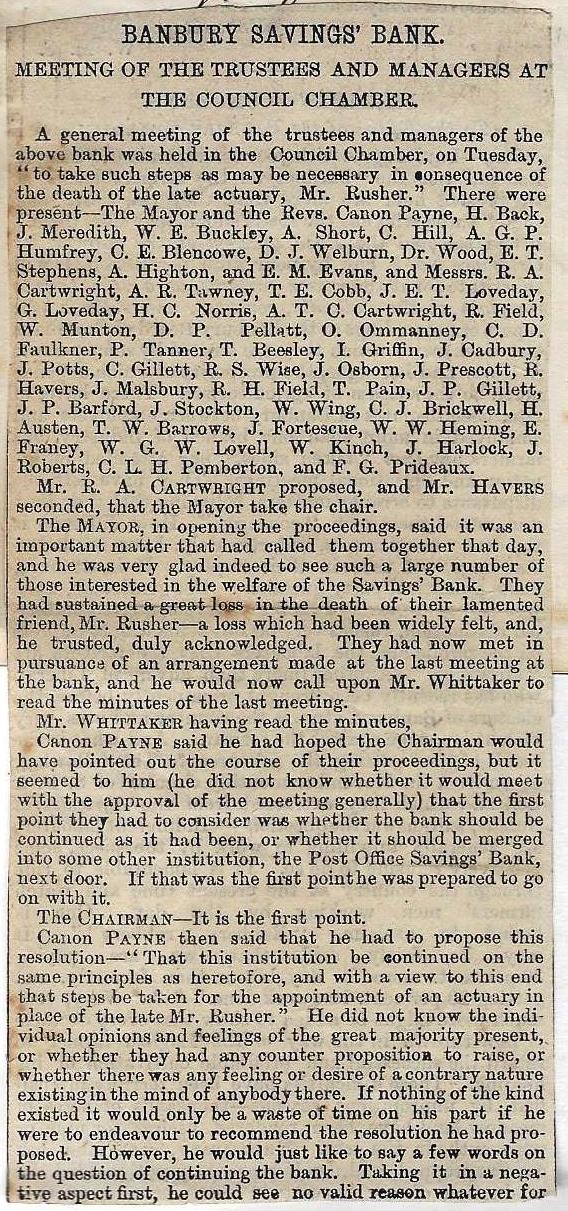
Part 1 of 5
17 Dec 1878
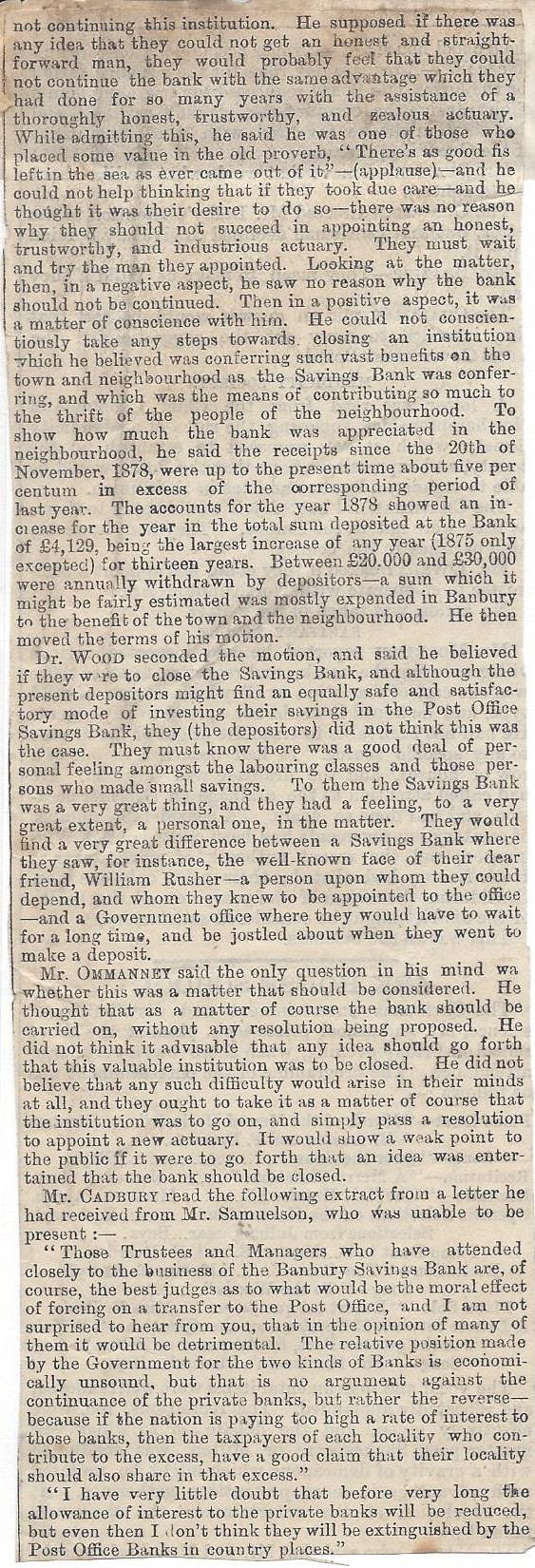
Part 2 of 5
17 Dec 1878
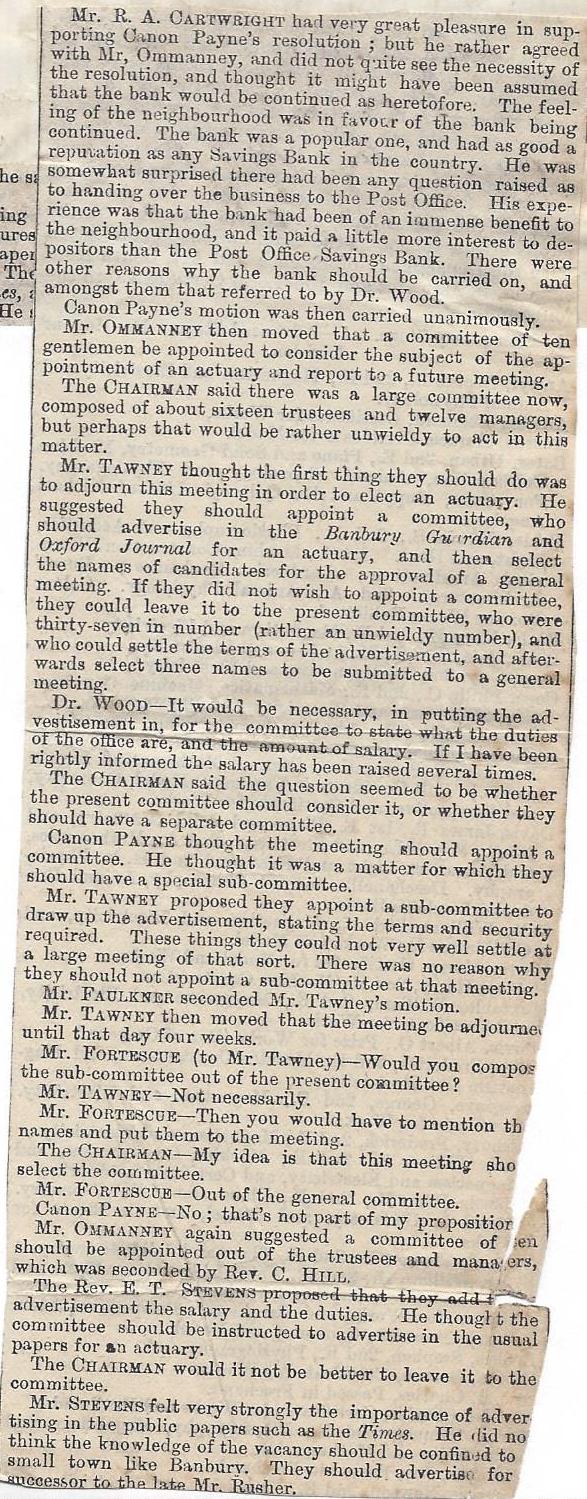
Part 3 of 5
17 Dec 1878
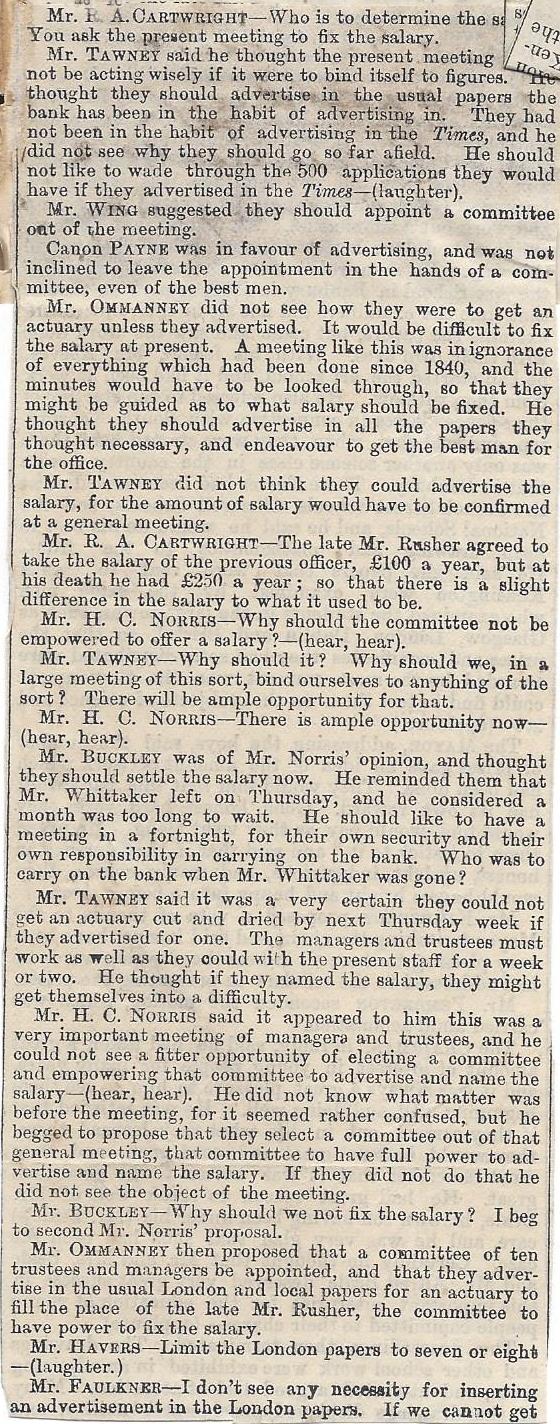
Part 4 of 5
17 Dec 1878
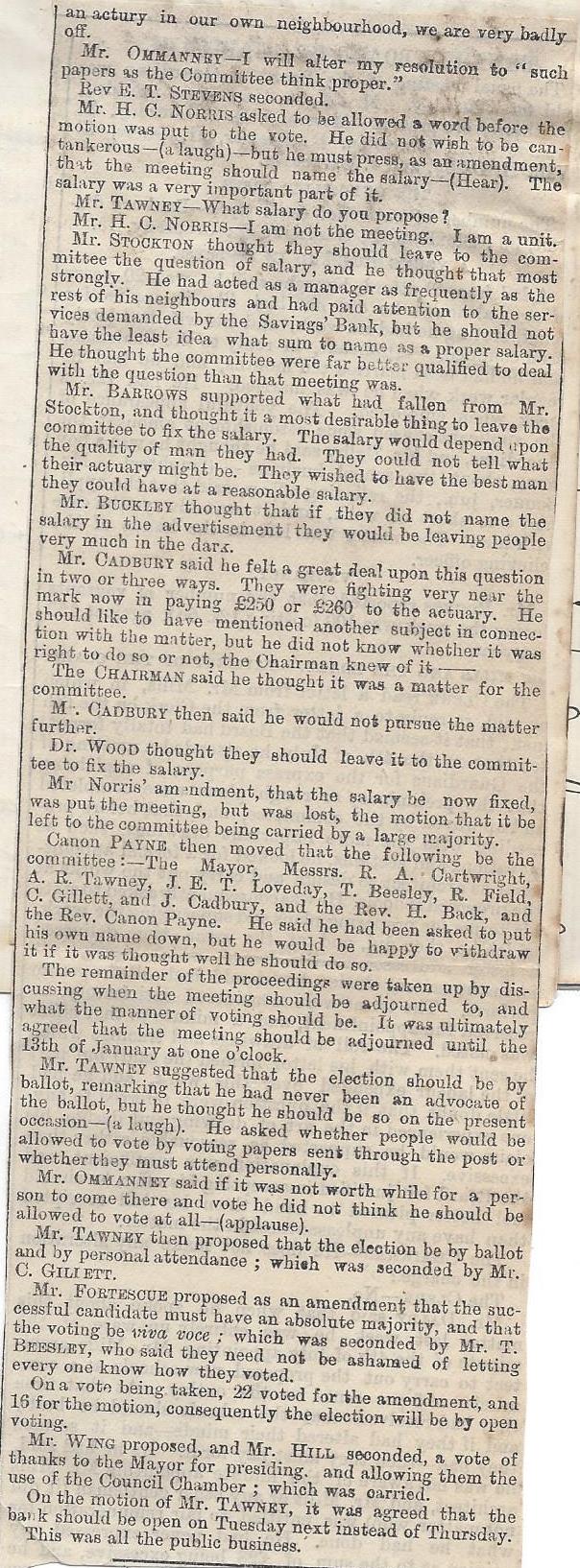
Part 5 of 5
17 Dec 1878





